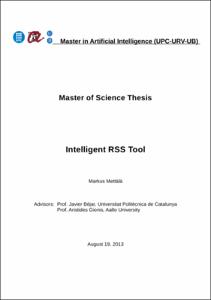Mostra el registre d'ítem simple
Intelligent RSS Tool
| dc.contributor | Béjar Alonso, Javier |
| dc.contributor | Gionis, Aristides |
| dc.contributor.author | Mettälä, Markus |
| dc.contributor.other | Universitat Politècnica de Catalunya. Departament de Llenguatges i Sistemes Informàtics |
| dc.date.accessioned | 2014-01-22T12:50:22Z |
| dc.date.available | 2014-01-22T12:50:22Z |
| dc.date.issued | 2013-08-19 |
| dc.identifier.uri | http://hdl.handle.net/2099.1/20431 |
| dc.description | Projecte realitzat en col·laboració amb la Aalto University |
| dc.description.abstract | Easy access to a wide range of information available online enables people to explore this information with an ambition to explore interesting content even more. This opportunity often leads to a problem of finding interesting and relevant information from the sea of knowledge. This problem is often referred to as the information overload problem, which is getting harder and harder to deal with as the amount of information available online grows. In this thesis, one source of information is exploited and organized in such a way that the task of discovering new content is made easier. We use Really Simple Syndication (RSS) as our source of information and two methods to categorize it: document clustering with K-Means and Latent Dirichlet Allocation (LDA). We use the textual information that the RSS contains, each RSS feed usually contains a specific set of topics. Our first goal is to perform document clustering to the data, in order to generate meaningful clusters with the help of natural language processing (NLP) techniques to preprocess the data. Our second goal is to analyze the clustered RSS feeds and exploit the similarities between the documents to generate meaningful user models based on user feed subscriptions. The third goal is to provide relevant recommendations based on the user models we have learned. We combine the current state-of-the-art methods and present novel methods to compare feeds. We exploit WordNet shallow ontologies in our novel method to create generalized representations of the feeds. The final goal is to develop a functional application that can leverage the methods we developed with the help of machine learning libraries. The method we propose is a combination of document clustering techniques, text similarity, feed modeling and recommendation system.The results of our experiments show that K-Means clustered documents combined with recommendations based on the feed contents yield the best results. Using WordNet to measure the similarity of words provides also promising results. Further exploring the advantages of using semantic similarities would be an interesting research topic in the document similarity measures. |
| dc.language.iso | eng |
| dc.publisher | Universitat Politècnica de Catalunya |
| dc.publisher | Aalto-yliopisto |
| dc.rights | Attribution-NonCommercial-NoDerivs 3.0 Spain |
| dc.rights.uri | http://creativecommons.org/licenses/by-nc-nd/3.0/es/ |
| dc.subject | Àrees temàtiques de la UPC::Informàtica::Sistemes d'informació |
| dc.subject.lcsh | RSS feeds |
| dc.subject.other | shallow ontologies |
| dc.subject.other | vector space distance measures |
| dc.subject.other | text classification |
| dc.subject.other | recommendation system |
| dc.subject.other | document clustering |
| dc.title | Intelligent RSS Tool |
| dc.type | Master thesis |
| dc.subject.lemac | Recursos electrònics en xarxa |
| dc.rights.access | Open Access |
| dc.audience.educationlevel | Màster |
| dc.audience.mediator | Facultat d'Informàtica de Barcelona |
| dc.audience.degree | MÀSTER UNIVERSITARI EN INTEL·LIGÈNCIA ARTIFICIAL (Pla 2009) |


